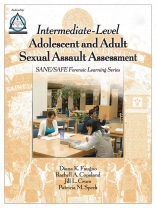128 pages, 56 images, 17 contributors
Intermediate-Level Adolescent and Adult Sexual Assault Assessment presents students with more complex case histories, including different forms of drug facilitated sexual assault scenarios, and are introduced to additional anatomic terms compared to the Entry-Level Assessment. They also have opportunities to identify normal anatomical variants and other patient-specific factors that should be considered during medical evaluations, evidence collection, treatment, and patient education. This assessment is designed to give novice and experienced sexual assault examiners the opportunity to learn, apply, and demonstrate competency in sexual assault evaluations of adolescents and adults. Upon completion of the Intermediate-Level assessment, you can continue to expand your knowledge and skills with the Advanced-Level volume.
Features and Benefits:
• Authored by internationally known SANE/SAFE experts
• Endorsed by the International Association of Forensic Nurses
• Formatted for self-study and group instruction
• Written for a broad audience to capture the diversity and scope of practice of sexual assault examiners
• Portable size and affordable price
Mục lục
Section I: Anatomical Review
1. 28-year-old Female Patient with Limited Memory
2. 23-year-old Female Patient from th Military Base
3. 16-year-old Female Patient with a 25-year-old Male Partner
4. 24-year-old Female Patient Assaulted by a Stranger
5. 16-year-old Female Patient Following a Party
6. 33-year-old Female Patient and Intimate Partner Violence
7. 24-year-old Female Patient Following a Party
8. 38-year-old Female Patient Assaulted by an Acquaintance
9. 19-year-old Female Patient Assaulted by Two Strangers
10. 16-year-old Male Patient Assaulted by His Athletic Instructor
11. Documenting a History and Reviewing a Case
Section II: Recommended Reading
Section III: Answer Key
Section IV: Test Questions
Giới thiệu về tác giả
Patricia Speck is an internationally recognized family nurse practitioner who specializes in public health and forensic nursing. She graduated from the University of Tennessee Health Science Center, College of Nursing and later completed her doctoral dissertation on sexual assault program evaluation. As a board certified family nurse practitioner, Patricia’s clinical practice focuses on the health aftermath of violence and her research centers on forensic nursing practice topics. She is a consultant, author, and lecturer on forensic nursing and has earned more than 20 local, national, and international awards and professional honors for her work. Patricia chairs the American Public Health Association’s Family Violence Forum and is a former president of the International Association of Forensic Nurses.












